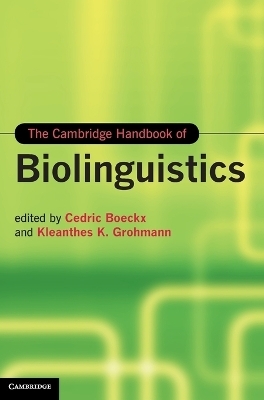
The Cambridge Handbook of Biolinguistics
Cambridge University Press (Verlag)
978-0-521-76153-6 (ISBN)
Cedric Boeckx is ICREA Research Professor at the Catalan Institute for Advanced Studies and member of the linguistics department at the University of Barcelona. Kleanthes K. Grohmann is Associate Professor of Biolinguistics at the University of Cyprus and Director of the Cyprus Acquisition Team.
1. Introducing the volume Kleanthes K. Grohmann and Cedric Boeckx; 2. Biolinguistics – a historical perspective Lyle Jenkins; 3. Biolinguistics yesterday, today and tomorrow Massimo Piattelli-Palmarini; 4. The philosophical foundations of biolinguistics James McGilvray; Part I. Language Development: 5. (Evidence for) the language instinct Ianthi Maria Tsimpli; 6. Sensitive phases in successive language acquisition: the critical period hypothesis revisited Jürgen M. Meisel; 7. Discovering word forms and word meanings: the role of phrasal prosody and function words Séverine Millotte, Elodie Cauvet, Perrine Brusini and Anne Christophe; 8. Luria's biolinguistic suggestion and the growth of language Ken Wexler; 9. Parameters in language acquisition Lisa Pearl and Jeffrey Lidz; 10. Bilingualism beyond language: on the impact of bilingualism on executive control Mireia Hernández, Clara D. Martin, Núria Sebastián-Gallés and Albert Costa; Part II. Mind, Brain, Behavior: 11. The role of experimental syntax in an integrated cognitive science of language Jon Sprouse and Diogo Almeida; 12. Working memory and language processing: theory, data and directions for future research Matthew Wagers and Brian McElree; 13. Computational primitives in phonology and their neural correlates Philip J. Monahan, Ellen F. Lau and William J. Idsardi; 14. Computational primitives in syntax and possible brain correlates Matthias Schlesewsky and Ina Bornkessel-Schlesewsky; 15. Computational primitives in morphology and possible brain correlates Ina Bornkessel-Schlesewsky and Matthias Schlesewsky; 16. Grounding the cognitive neuroscience of semantics in linguistic theory Liina Pylkkänen, Jonathan Brennan and Douglas Bemis; 17. Modularity and descent with modification Gary F. Marcus, Cristina D. Rabaglia and Hugh Rabagliati; 18. The role of Broca's area in language function Gregory Hickok; 19. Lexical retrieval and breakdown in aphasia and developmental language impairment Naama Friedmann, Michal Biran and Dror Dotan; 20. Genetics of language: roots of specific language deficits Antonio Benítez-Burraco; Part III. Language Evolution: 21. The cognitive capacities of non-human primates Klaus Zuberbühler; 22. Birdsong for biolinguistics Kazuo Okanoya; 23. Language, culture and computation: an adaptive systems approach to biolinguistics Simon Kirby; 24. Language and natural selection Derek Bickerton; 25. The fossils of language: what are they? Who has them? How did they evolve? Sergio Balari, Antonio Benítez-Burraco, Víctor M. Longa and Guillermo Lorenzo.
| Erscheint lt. Verlag | 14.2.2013 |
|---|---|
| Reihe/Serie | Cambridge Handbooks in Language and Linguistics |
| Zusatzinfo | 3 Tables, black and white; 10 Halftones, unspecified; 10 Halftones, black and white; 32 Line drawings, black and white |
| Verlagsort | Cambridge |
| Sprache | englisch |
| Maße | 182 x 253 mm |
| Gewicht | 1370 g |
| Themenwelt | Geisteswissenschaften ► Psychologie ► Allgemeine Psychologie |
| Geisteswissenschaften ► Psychologie ► Verhaltenstherapie | |
| Geisteswissenschaften ► Sprach- / Literaturwissenschaft ► Sprachwissenschaft | |
| Naturwissenschaften ► Biologie ► Evolution | |
| ISBN-10 | 0-521-76153-0 / 0521761530 |
| ISBN-13 | 978-0-521-76153-6 / 9780521761536 |
| Zustand | Neuware |
| Haben Sie eine Frage zum Produkt? |
aus dem Bereich


